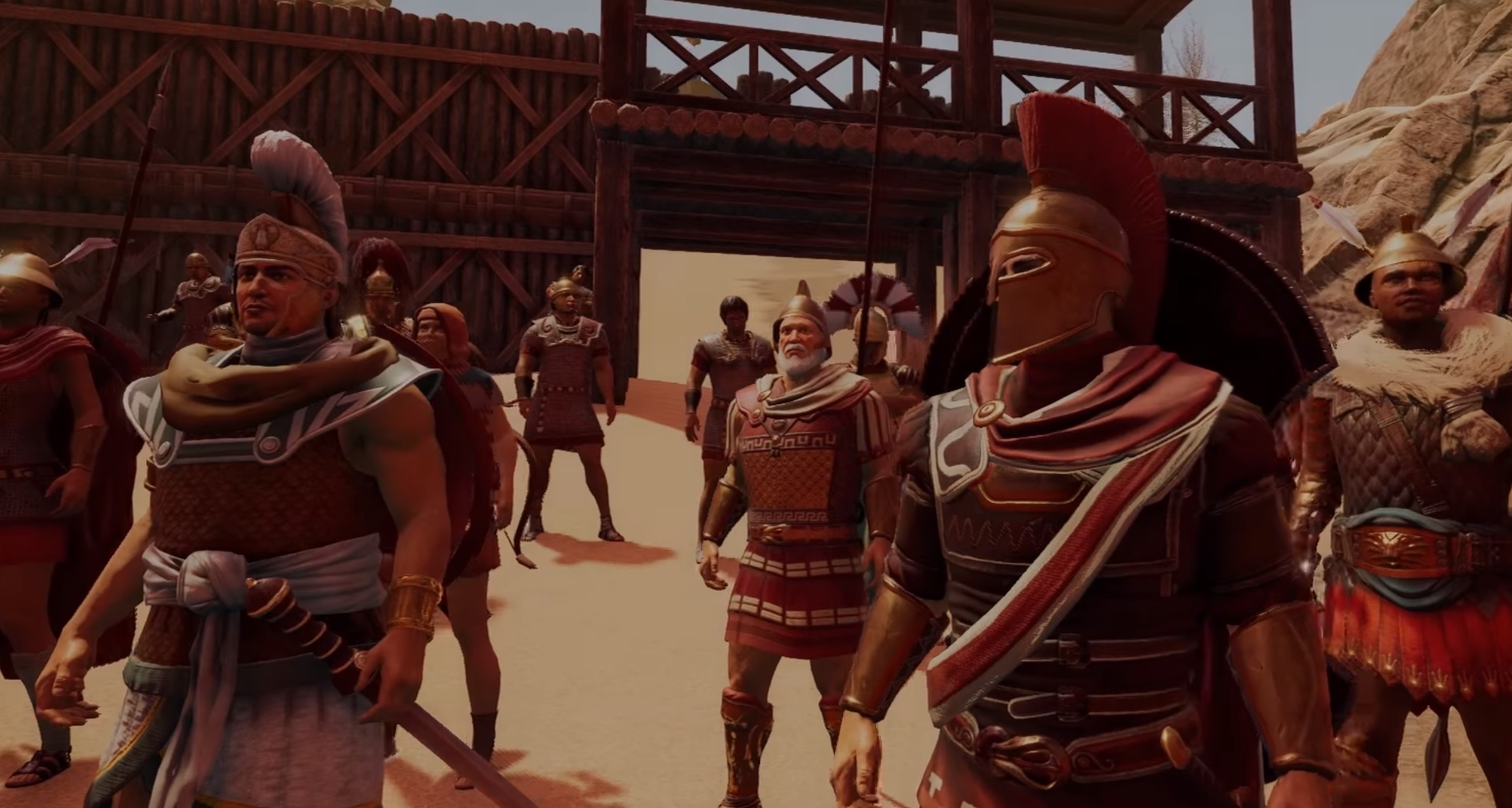Our Verdict
An uneven epic whose historical richness guides it through some awkward pacing.
PC Gamer's got your back
What is it? Historical RPG with strategy elements set in an alternative-history Rome
Expect to pay £30/$36
Release date Out now
Developer Logic Artists
Publisher THQ Nordic
Reviewed on Ryzen 7 5800H, Nvidia GeForce 3070 (mobile), 16GB RAM
Multiplayer? No
Link Steam page
It's taken me dozens of hours—and at least a dozen more than I'd have liked—but finally I've done it. I've built a digital legacy for Robertus Atellius Somethingus that's worthy of the glory (and twatty imperialistic entitlement) of Rome. I've assembled elite legions that have conquered Asia Minor, north Africa and Gaul, I've besieged cities, toppled corrupt Senators, assassinated enemies with my Wild Bunch of praetorians, and impressed a particularly horny and hubristic Cleopatra with my arrogance.
It's a solid CV for anyone applying for the role of Ancient Roman Consul.
Expeditions: Rome is a historical RPG that streamlines elements from games like Total War, with its campaign maps, and Divinity: Original Sin, with its tactical turn-based combat and CRPG-style overworld traversal, into an adventure that spans vast swathes of the Classical world.
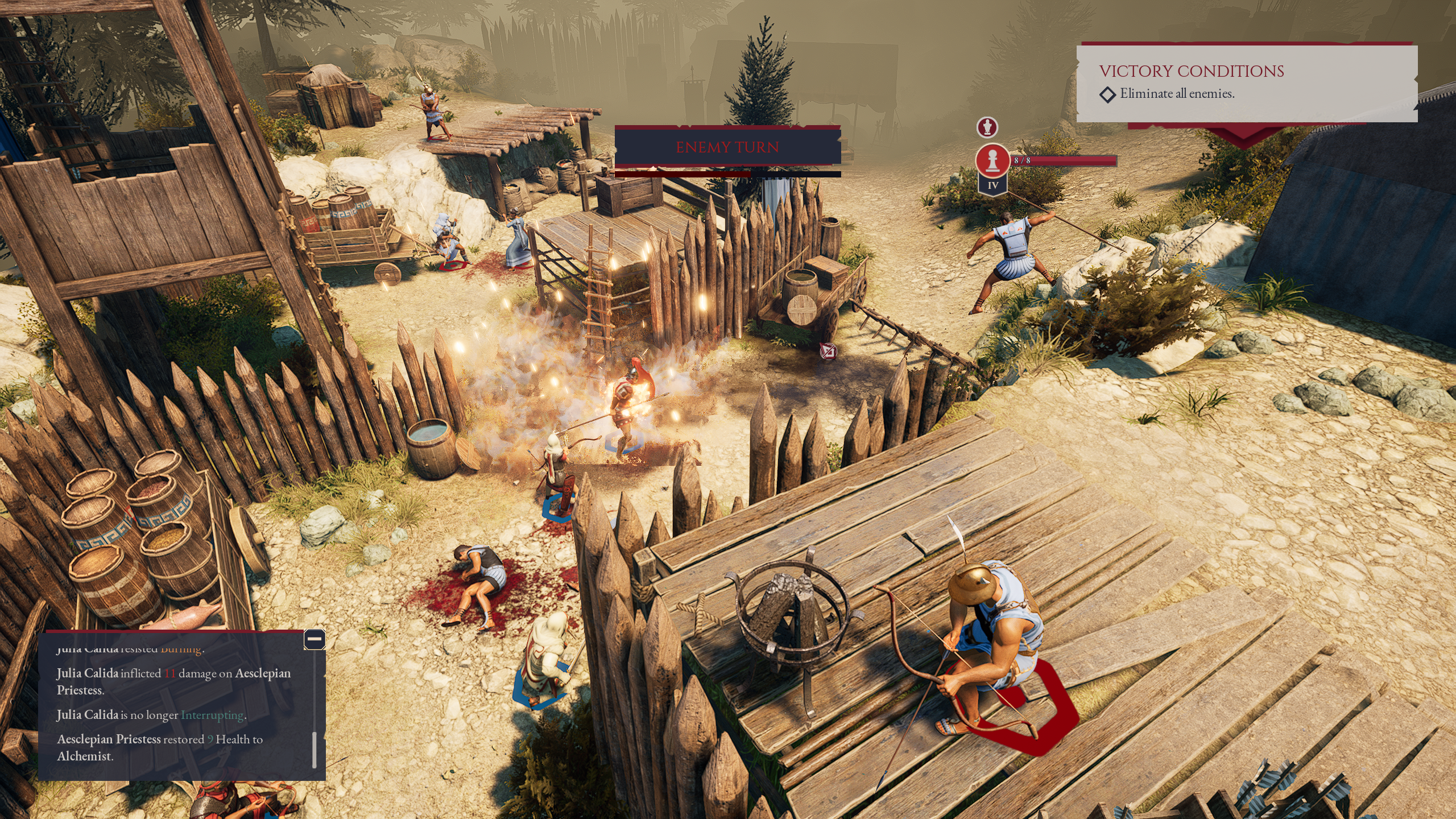
The Divinity parallels are no coincidence. Developer Logic Artists' previous historical RPGs, Viking and Conquistador, impressed Larian Studios enough that they were taken on to co-develop Divinity: Fallen Heroes before that project was put on hold (presumably due to the development of Baldur's Gate 3). In short, this developer is no plebeian when it comes to this kind of game.
Expeditions: Rome smooths out the more fiddly RPG traits. When you level up, you only upgrade a single skill for that character rather than diddling around with attributes or secondary skills, and you don't need to spend hours fobbing off junk items to different traders, as you can break them down straight into crafting components instead. It's a fair call, because at 70+ hours this game is long enough without all that micromanagement.
You'll have several companions join you on your quest—among them a former gladiator, a philosopher-warrior with a shameful past, and a woman scout who does a particularly unconvincing 'keep a hood over your face and sound a bit gruff to pass as a young man' act before giving it up a few hours in. There's enough banter between them to build up some fondness for your crew, and the possibility of death or injury to them means that you need to recruit backup praetorians at your encampment so you can substitute them in like you're playing Football Manager 50 BC, or Procurator Pediludium 704 Ab (leave your corrections in the comments, Latin scholars).

But their associated sidequests, like most sidequests in the game, struggle to squeeze in around the main story, like jam barely clinging to the edges of an overstuffed sandwich. Nor do your companions seem particularly affected by your actions. Despite the constant feed telling you that conciliatory/arrogant/stoic/sexist characters approve or disapprove of key decisions you make, I didn't experience the repercussions or consequences of those throughout the game.
In fairness, there's little time for getting cosy with companions when you've got an entire Roman legion to manage. As a member of an esteemed Roman family under threat from a powerful Senator dead set on your extinction, you get shipped out to a Roman army trying to retake Asia Minor (the fact that you're being sent to war 'for your own safety' shows just how feisty things can get in high-level Roman politics). Before long, you prove yourself in battle and rise to the position of Legate, commanding a thousands-strong Roman legion while running around with your crack squad on clandestine missions like assassinations, disrupting enemy supply lines, and trying to expose the corruption of the rival Roman family out for your head.
A good part of the game is spent on an overworld map, from which you can send your party of praetorians and your army on missions around the land. The legion can attack and defend cities, and procure resources like lumberyards, mines and farms that you use to upgrade your encampment. You can recruit new praetorians and army commanders through the barracks, craft weapons and armour at the forge, and even build a bathhouse, where stationing a praetorian with the 'social' trait will steadily increase the morale of your legion (not sure whether standing around naked in a bathhouse comrading fellow soldiers was a real permanent position in the Roman legion, but it was an invaluable role in mine).
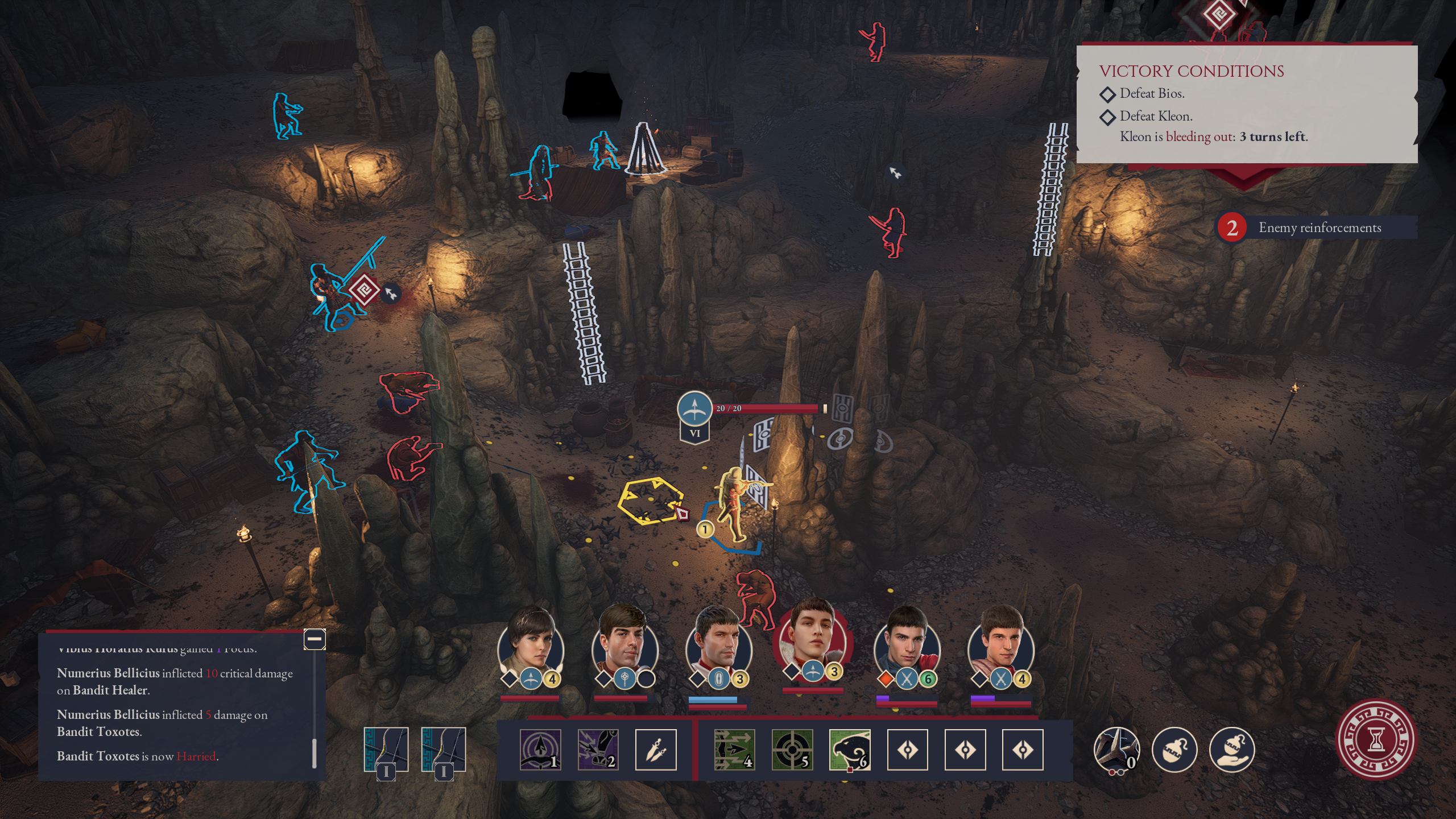
Along with the main quest you carry out with your praetorians, each act requires you to take over a certain portion of the map with your legion to progress the story. The legion battle system has some interesting quirks, like choosing commanders for battle and using stratagem cards to decide your army's actions, but once it became apparent to me that it's all just a numbers game (I didn't lose a single battle), I'd end up auto-resolving instead of watching my blue squares bump up against the enemy red squares. A sad fate for a potentially compelling layer.
The bulk of your time is spent with your party of praetorians, with whom you get to explore cities, chat to NPCs and engage in solid but often overlong turn-based combat. In a nice CRPG touch, as you traverse the overworld map you'll happen upon random text-based events, which are always specific to whichever land you're in (Asia Minor in Act 1, North Africa in Act 2, Gaul in Act 3). You'll get to try suspicious foods proffered by Berber women in their rug-padded huts, decide what to do with dead bodies you stumble upon, and decide how hammered to get on wine as you make camp for the night. These events are wonderfully written, and the overlap in many of them between superstitions and reality is befitting of a time when magic was still a widely used explanation for worldly phenomena.
In the turn-based combat, you use cover in the environment, secure high ground for your archers and attempt to funnel and flank your enemies into submission. There's no initiative stat here, so you can carry out partial turns with one character, switch to another, then go back to the previous one. You can even carry out a character's turn while another is still moving across the map, which gives proceedings a nice fluidity.
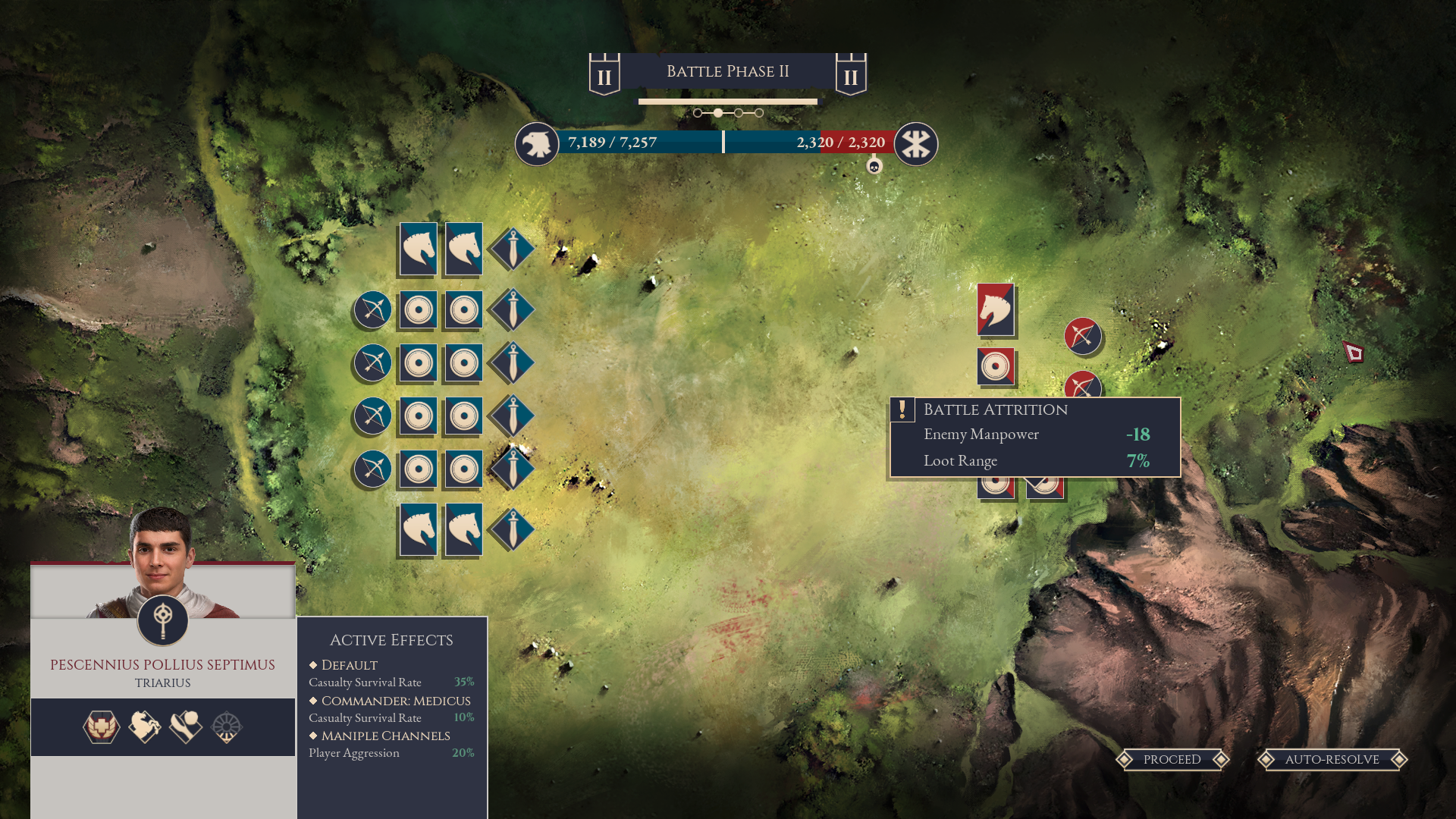
There's infinite satisfaction in throwing down some caltrops that force enemies to pathfind their way into a death field overwatched by your archer, or in pelting the Pharaoh of Egypt and his elite guard with poison and fire bombs before encircling them with your troops, then pummelling them with Attacks of Opportunity as they try to escape.
But by the gods can that combat get drawn out. You're almost always outnumbered, which I guess was intended to give those end-of-chapter city sieges and ambushes by Gallic warriors a grander sense of scale and intensity. The sheer number of units, however, means you're spending too much watching enemies, friendly units, even civilians have their turns (which is especially frustrating when the friendly AI is making nonsense moves like running through fire just to finish off an incapacitated enemy).
I thankfully discovered—after about 50 hours—that I could crank up the turn speed, but even then some of the siege encounters could take half a day to complete. The turn-based combat is good, but it suffers at that kind of scale, when at the end of each turn you spend around 70 seconds watching 15, 20 units zigzagging around a hex-based battlefield. It makes you all too aware of the synthetic nature of the combat and pulls you out of the action.
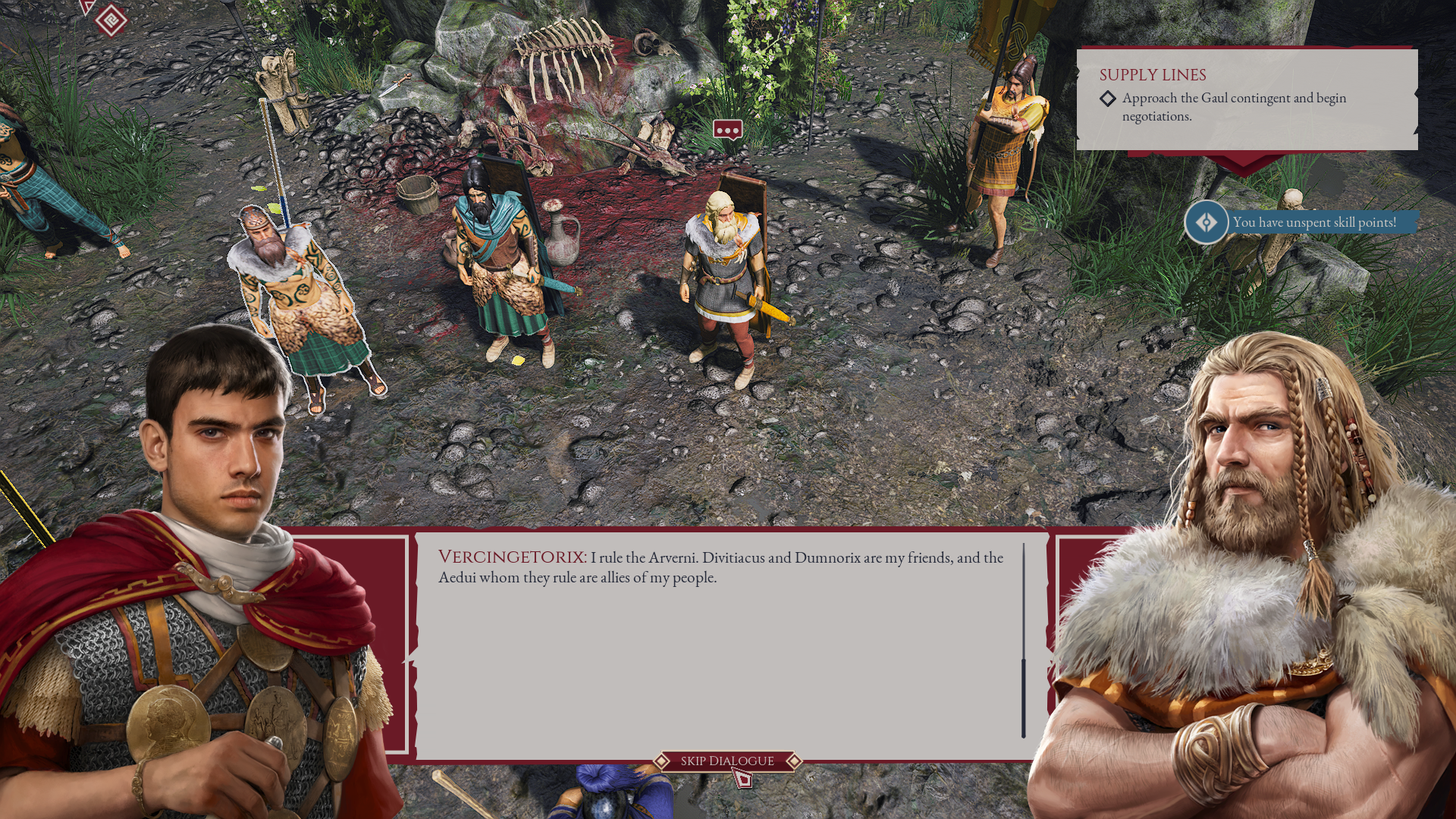
This could've been offset had the game offered a bit more RPG freedom—the ability to stealth or sweet-talk your way through situations, for example. While your character can have personality traits that evade a few combat scenarios, the game really wants you to fight, but by the latter stages an irrelevant 30-minute battle triggered by a random event on the overworld map just feels like a waste of time.
And speaking of time-wasting, I kept finding myself in situations where I had to have certain characters available for a mission, but couldn't do it because one of them was in my encampment infirmary after getting injured in a random event. Given the lack of sidequests, I'd too often just let a day or two of in-game time pass as they healed, grab them from the infirmary, then get back to what I was doing. Between this and the combat, it feels like the game could've trimmed a good 12 hours off its length and been better for it.
Where Expeditions: Rome really shines is in its attention to historical detail. Most environments aren't particularly interactive, but the flexible overhead camera lets you zoom in to appreciate the patterned wall and floor tiling of a Roman villa, the vibrant rugs adorning a Berber war tent, or discern the drawings and hieroglyphs in an Egyptian tomb where a rogue Roman legion is hiding out. Weapons and armour, meanwhile, all have Latin names and what I can only presume are historically faithful designs (either way, they look lovely).
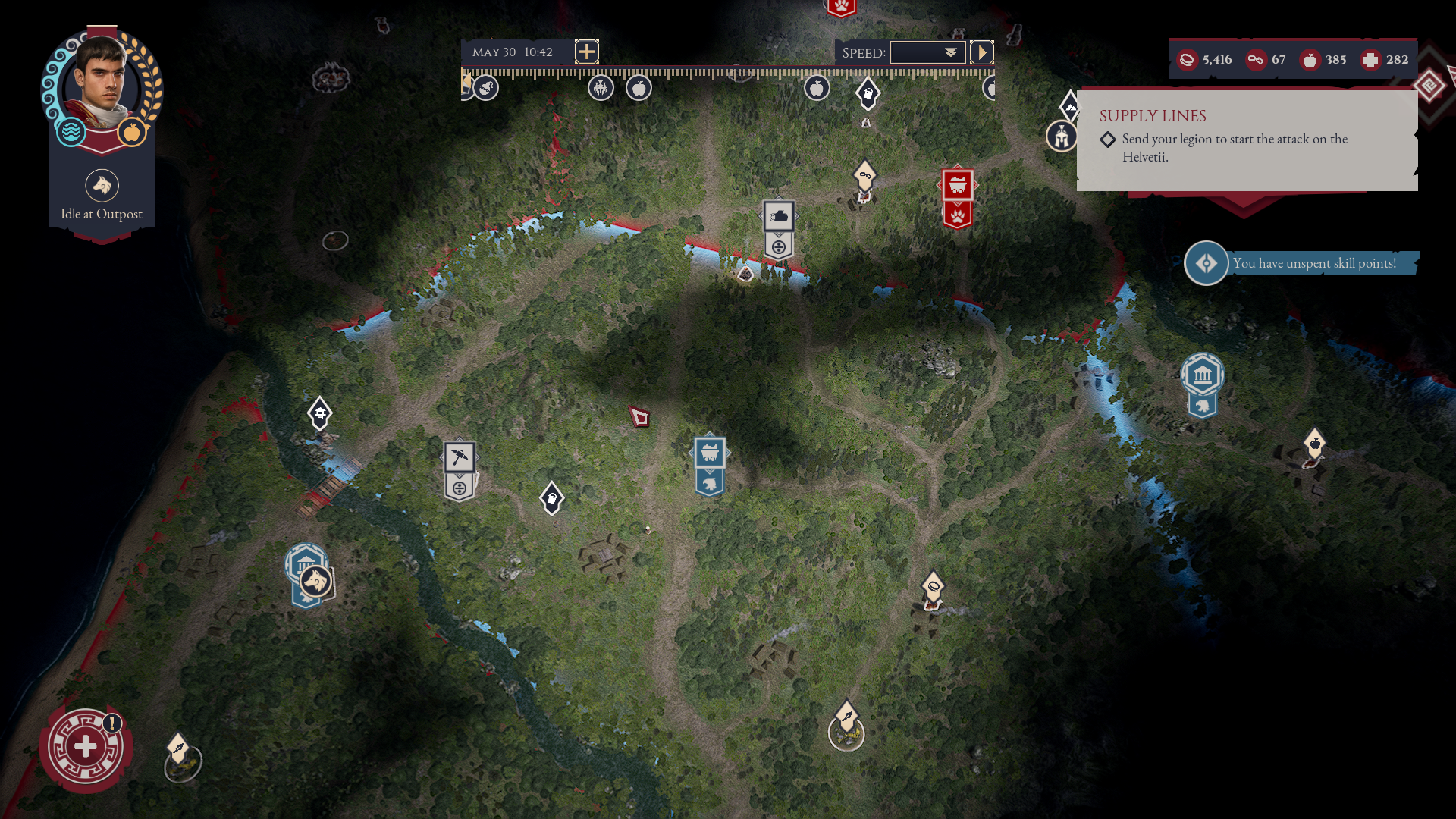
This is a game that familiarises you with the salutations, customs, weaponry, even diets, of the ancient world's denizens while delivering a sweeping story of war and politics that also feels historically grounded despite letting you shape that history.
That historical angle, and the journey it takes you on across three distinct regions of the ancient world, makes this a worthwhile expedition, especially if you're interested in the era. Like the good Roman Legate you are, however, you'll need to remain stoic in the face of some friction along the way.
An uneven epic whose historical richness guides it through some awkward pacing.
Robert is a freelance writer and chronic game tinkerer who spends many hours modding games then not playing them, and hiding behind doors with a shotgun in Hunt: Showdown. Wishes to spend his dying moments on Earth scrolling through his games library on a TV-friendly frontend that unifies all PC game launchers.
